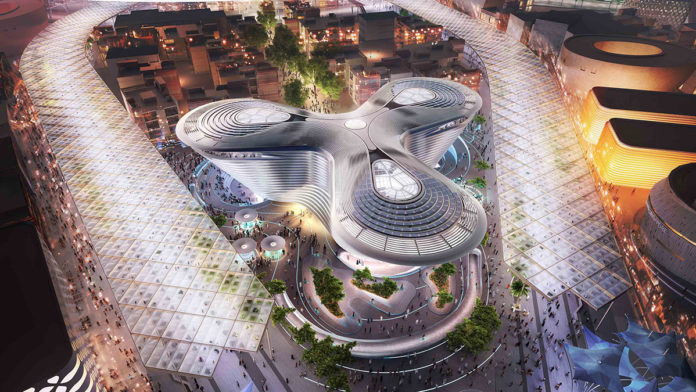The United Arab Emirates (UAE) is the regional leader of innovation, smart economy, artificial intelligence and human capital. The UAE is also leader of re-exports, financial hub, investments and last but not least one of the idealist hub of human wisdom, interaction and knowledge. Innovation is the mean to survive on this planet which has become more polarized and divided due to manipulation of so many state and non-state actors.
The UAE has been adopted and implemented various innovative strategies in different business sectors that open multiple doors to foreign business investors to come to a step forward and set up business roots in UAE. The year 2019 has been chosen to drive the start up dreams of budding entrepreneurs for which the Middle-East Government and citizens have come together to magnify the tech growth and leverage its reach.
UAE Innovation Strategy
The UAE adopted Innovation Strategy in 2014 which has further diversified its macro-economy. It was introduced to infuse innovation in every business sector to nurture growth opportunities in every possible direction that would ultimately position UAE amongst the most innovative countries. The key idea in 2019 is to generate more creative products and services that would eventually improve the quality of life. The National Innovation Strategy is structured around the following pillars:
The UAE Innovation strategy has been designed in such a way that it would also attract international investments with ideas. The key components of the enabling environment include:
1. Innovation Regulatory Framework
This would consist of the supporting laws and regulatory framework that would promote the innovation framework. The core aim is to protect the intellectual property rights that provide the best measures to save the human mind creations.
2. Technology Infrastructure
The NIS aims at providing the best technical assistance to remove any obstruction that comes in the way of communication. Competitive and cost effective technology is used to make the optimal use of resources that would boost innovators and incubators to go forward.
3. Enabling Services
A fast track education system holds the future of an economy. NIS aims at providing the best education system to promote research and development across universities while giving them access to come forward and convert business ideas into significant projects.
4. Investment and Initiatives
The NIS seeks to come up with innovative funding options that would meet the needs of both individuals and business entities. This will also strengthen the financial scenario in the Emirates economy.
It widens a broad platform to start-ups and established businesses to grab the right person for the right job because contribution made by an individual do a count. The NIS aims at grabbing talented individuals, nurture their skills at an early age, and help them to harness their potential. It aims at:
- Develop national talents and culture
- Identify and sponsor individuals at an early stage
- Promote a widespread culture of innovation and entrepreneurship
- Develop easy access to global skills
- Introduced the innovative curriculum in schools and universities
- Launch creative competitions at school and university level
It brings the significant sectors where NIS is trying to infuse innovation. The utmost priority has been given to the following sectors:
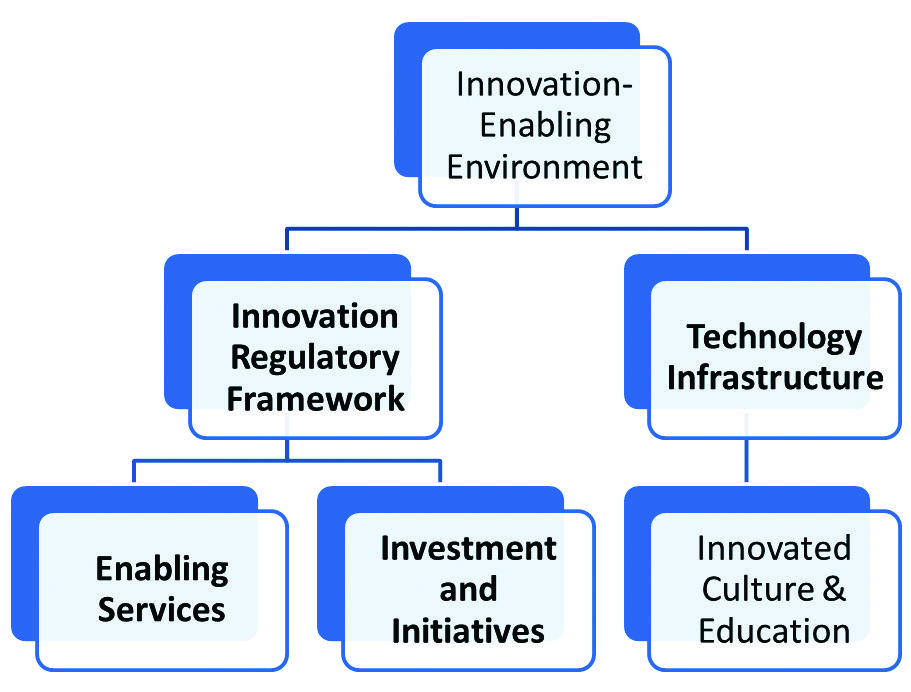
1. Renewable and Clean Energy
Understanding the increasing demand for the energy, the UAE has been involved in numerous projects such as Masdar, Mohammed bin Rashid Al-Maktoum Solar Park, the Emirates Nuclear Energy Corporation etc. The core aim is to develop energy industries in the Emirates that would strengthen the energy network as well as contribute towards decentralisation of energy throughout the nation.
2. Transportation
UAE is defined as one of the world’s famous tourist-spot. Currently, it carries out operational activities around 65 seaports and 75 airports at a global level. The NIS aims at developing strategies to boost and implement the idea of un-manned cars and trains.
3. Space
The space agency in UAE was launched in the year 2014. Since then, a count of 20 billion AED was invested in space technologies. The nation is trying to launch the Arabic Islamic unmanned Probe to Mars by 2021. The NIS aims to boost the space institutions like EISAT, Yahsat etc. by enhancing the research and technology, ultimately turning UAE as one of the leading countries in the field of space research.
4. Technology
The NIS aims at building smart cities, and expands the areas of artificial intelligence, semiconductors, nanotechnologies, 3D printing etc. to boost future technology across multiple industries.
5. Education
The National Strategy aims at providing top quality education across schools and universities, by introducing Smart Learning that will help the young generation to learn their interested fields with a creative approach.
6. Health
Another sector where NIS is seeking to provide the best innovation count is the health sector. It aims at developing more pharmaceutical and biotechnological industries that would boost the sector and make the Emirates as the leading platform for healthcare industries.
7. Water
To solve out the most prominent global concern of water scarcity, the NIS seeks an opportunity to implement innovative strategies in the water sector by enhancing production, purification, and desalination. This will overcome the regional as well as the global water challenge.
8. Vision 2021
Another project that will turn bring a transformational change in the economy of Emirates is Vision 2021. Launched by H.H. Sheikh Mohammed bin Rashid Al Maktoum at the Cabinet Meeting in 2010, the Vision 2021 is nearing its way. Taking charge to improvise certain sectors, the Vision 2021 aims:-
- Building a world class healthcare
- First rate education system
- Sustainable environment and infrastructure
- Cohesive society and preserved identity
- Public safety and fair judiciary
- Innovated Economy
Innovated Economy
Macro-Economy of the UAE is innovated and rapidly progressing towards non-oil development. Development of renewable energy resources, smarter economy, rise to artificial intelligence, and institutionalization of start-up chains are the future of UAE.
Several Developmental Milestones
UAE economy has achieved several developmental milestones in 2018-2019, which have contributed to stimulating its growth, enhancing its competitiveness and ensuring the sustainable development of the economy. Furthermore it has strengthened its regional and global reputation as an economic hub which is achieved with the balanced and positive performance of the economy. Envision of a comprehensive growth strategy based on diversification, sustainability, openness, active engagement with global markets, forging partnerships and adopting prudent approaches to emerging socio-economic development trends are the few key factors in its outstanding performance during 2018-2019.
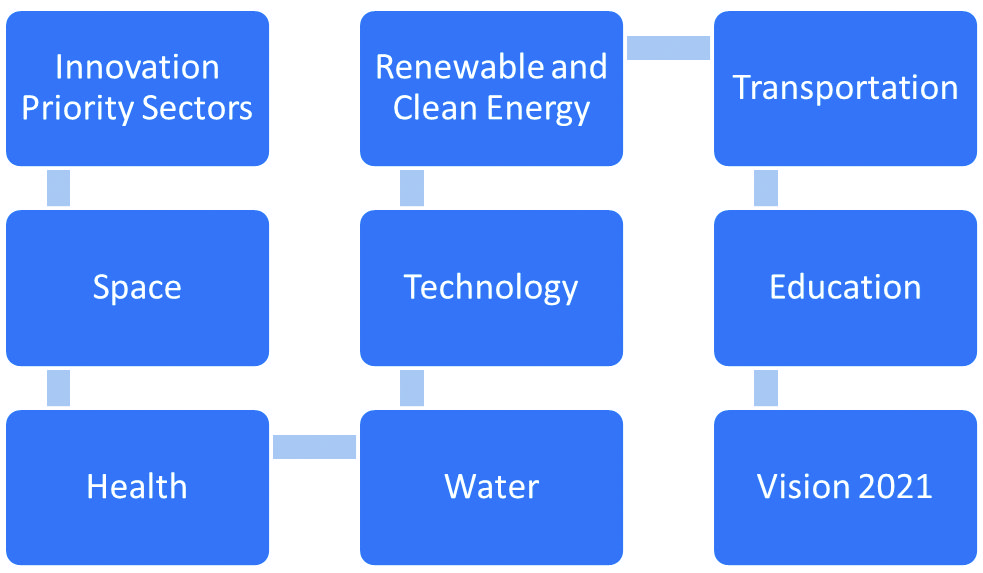
Consolidation of Economic Development
During 2018-2019 the UAE focused on consolidating its economic development and finalising strategic plans and initiatives to fast-track its national growth objectives, guided by the country’s leadership. UAE has been adopted structural reforms, policies and plans to stimulating the environment of innovation, technology, scientific research and intellectual property as engines of development and transformation into a globally competitive digital economy; developing business-friendly systems and legislation; attracting value-added sectors; enhancing the role of the private sector; promoting entrepreneurship through supporting SME and startups; and developing national human resources.
UAE: Integrated Strategies
The UAE continues to march ahead in its development path, based on integrated strategies for continuous development and modernisation, most notably the National Agenda 2021, the UAE Centennial 2071, and the post-oil economy plan, among others.
Federal Competitiveness and Statistics Authority
According to the Federal Competitiveness and Statistics Authority (2018) its GDP, at current prices reached approximately AED1405 billion, achieving a growth rate of 7.2 percent over 2016, while the non-oil GDP at current prices for 2017 amounted to about AED1092 billion with an increase of 3.2 percent over 2016, which makes the contribution of non-oil sectors in the GDP of the state achieved a rate of 77.7 percent, according to current prices.
Real GDP
The real GDP of 2017 at constant prices (2010 is a base year) amounted to more than AED1422 billion with an increase of 0.8 percent compared to 2016, while the real non-oil GDP for the same year was about AED1 trillion, achieving 2.5 per cent growth over 2016. Thus, the contribution of non-oil sectors to real GDP reached 70.5 percent, which reflects a positive trend in fast-tracking the economic diversification agenda of the State.
International Monetary Fund
The International Monetary Fund, IMF, confirmed that the UAE economy has displayed flexibility and adaptability in the face of low and volatile oil price challenges over the past years and that the country has adopted effective fiscal and economic policies that have had the most significant impact on maintaining the strength of the economy. The country’s current account surplus is expected to exceed seven percent of GDP this year as the momentum of non-oil economic activity increases, raising the real GDP growth estimate for the country in 2018 to 2.9 percent, with a further rise expected during the coming year, at a rate of 3.7 percent.
Enhanced Share of Non-Oil Sector
Concerning economic diversification, the IMF has predicted that the contribution of non-oil GDP will increase to 2.9 percent by the end of 2019 and that it will continue to grow next year to about four percent.
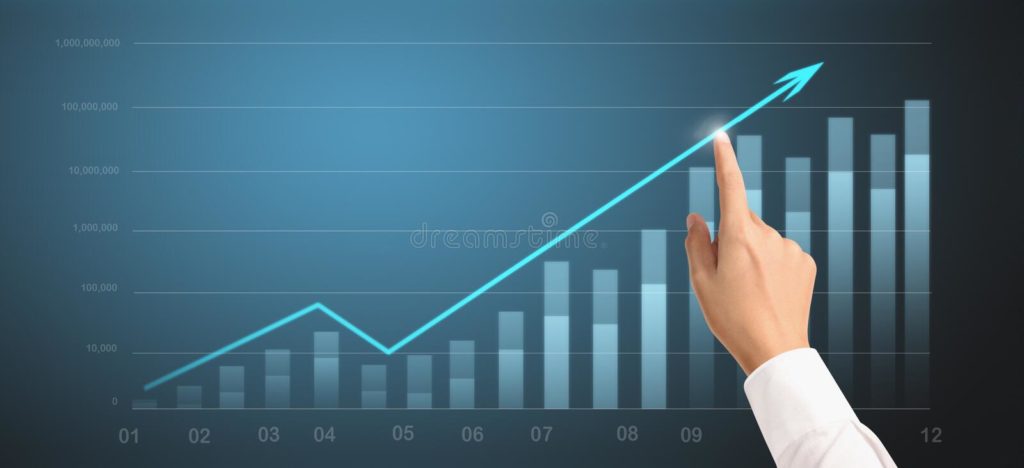
Positive Indicators
The prospects for economic growth of the UAE includes many positive indicators in the coming years, given the growth of its non-oil sectors, the continued investment spending on development projects, strategic initiatives and incentives to increase investment attractiveness, and accelerated investments associated with the hosting of Expo 2020 Dubai.
Massive Diversification
UAE is on the right path of massive diversification which reflects the increase in economic diversification and the development of non-oil sectors, where a group of vital and value-added industries have witnessed good growth rates, notably the manufacturing industry, which grew by 3.4 percent, and the ITC sector by 3.4 percent, agriculture and fisheries by three percent, transport and storage sector by 2.7 percent, real estate sector by 2.8 percent, health sector by 4.4 percent and areas related to tourism, such as arts, entertainment and service promotion, by 3.9 percent.
UAE’s non-oil sectors witnessed significant progress over the past years, and continued its support and growth during 2018-2019 mainly in the domains of physical and electronic infrastructure, space sector, logistics and transportation services, financial services including the merger of banks to form giant global business entities, renewable, nuclear and clean energy sector, foreign trade and wholesale and retail trade including e-commerce, SME’s and start-ups sectors including development of support, financing and training systems, technology and ITC sector, manufacturing such as petrochemicals, building materials, metal industries, food and pharmaceutical industries, as well as tourism, which includes the development of facilities, resorts and strategic tourism-related projects.
Investment Environment
UAE witnessed a surge in efforts to develop the investment environment in the country, through the promulgation of Federal Law No. 19 of 2018 on Foreign Direct Investment, which represents a qualitative leap in enhancing the incentives and advantages offered by the state to foreign investors and developing a safe and attractive investment environment. It guarantees 100 percent ownership of projects in specific sectors, facilitating investment protection guarantees, financial transfer options and the possibility of amending the partnership, mergers, acquisitions and transfer of ownership consistent with the investor interest, according to a set of controls and standards. It is a new and fresh start towards strengthening the globality of the national economy in line with future development trends, where it aims to enhance the confidence of foreign investors and motivate major international companies to invest in the country’s markets, especially in the fields of innovation, technology, space, renewable energy and AI.
UAE’s FDI Incentives
The UAE has a wide range of foreign investment incentives for doing business and signed 78 agreements to protect and encourage investment and 115 agreements to avoid double taxation of income with certain countries until 2017. It is also a member of the ‘Great Arab Free Trade Agreement’, GAFTA, signed within the framework of the Free Trade Agreement, FTA, with Singapore.
FDI flowing into the UAE in 2017 were recorded at around US$10.4 billion, up 7.8 percent from 2016. In that year, the state accounted for 40 percent of the total investments received in Arab and West Asian countries, and 23.3 percent in the Middle East and North Africa, MENA, region in the same year as well.
UAE’s Arab Leader
The UAE ranked the first in the Arab world and 30 on the list of the best countries in the world in attracting FDI, advanced five ranks for the classification of 2016 according to the World Investment Report 2018 of the United Nations Conference on Trade and Development, UNCTAD. However, the UAE’s cumulative balance of FDI inflows until 2017 was about US$130 billion, with a nine percent growth over 2016. Also, the UAE ranked 1st in the Arab region and 21st globally concerning FDI outflows to the world, estimated at US$14 billion during 2017, with a growth of 7.7 percent over 2016. It is expected that there would be a 15-20 percent growth in the volume of FDI inflows to the UAE during 2019-2020 and that the state aims to increase the share of the contribution of FDI in current prices to five percent by 2021, as compared to three percent currently.
Productive Trade Policy
The UAE trade policy is based on establishing an extensive network of commercial partnerships and developing world-class infrastructure to support business activities while maintaining its trade liberalisation policies and facilitating the movement of goods and services across borders. It is one of the leading countries in the world today regarding the facilitation of international trade reaching advanced rankings in trade exchange. The state is currently ranked first in the Arab and regional markets in the import and export of goods and services, while it is ranked 15th globally in commodity exports, 18th globally in commodity imports, 21st globally in services exports, 17th globally in services exports according to the World Trade Organisation, WTO, statistics for 2017 and ranked third in the world in terms of re-export, accounting for about 13 percent of the world’s total re-exports in 2017.
Average export growth in the country is equivalent to eight percent, and imports registered seven percent growth, as compared to the two percent average growth in both exports and imports.
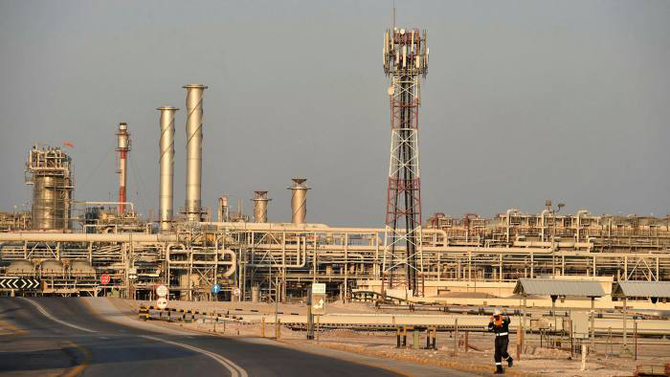
Surge in Non-Oil Trade
During 2018 the value of non-oil foreign trade, including free zone trade, amounted to AED1.612 trillion, of which AED979 billion were imports, and AED443 billion were re-exports. In 2017, the country witnessed exports in more than 100 regional and global markets. Today, the UAE is the largest Arab trading partner for Asia, Europe, Africa and the Americas. It accounts for 44 percent of total non-oil trade between Arab and Asian countries, 27 percent from total trade with Europe and 37 percent with North and South America.
UAE’s E-Commerce Market
A recent report by the World Economic Forum predicted that by 2020, the UAE’s e-commerce market will reach about US$27 billion (AED100 billion), a 100 percent growth over 2016, as compared with about US$69 billion in the total e-commerce market for Arab countries in the same year, which brings UAE to the top spot in the region, dominated by 39 percent of the total value of electronic commerce cash to the Middle East. UAE’s SMEs entrepreneurship sectors are contributing greatly in its overall GDP. Institutionalization of the Intellectual Property (IP) framework is another pillar of the UAE’s efforts to foster a culture of innovation, build a knowledge economy and enhance the competitiveness of the business sector.
Booming Tourism
The tourism and travel sector accounts for more than 14 percent of the UAE’s GDP for 2018-2019, which is equivalent to more than AED154 billion, according to the results of a report from the World Travel and Tourism Council 2018. UAE has implemented many initiatives and activities that were aimed at promoting tourism development at the national level. These initiatives and activities, which were performed in collaboration with various partners, included organising roadshows in India, Russia and Scandinavia to introduce the UAE leading tourism destinations and raise its share in the world tourism markets.
Expo 2020 will be held in Dubai next year. Its final preparations are in full swing. Most recent its official countdown has been celebrated in the UAE. The first World Expo to be held in the Middle East, Africa and South Asia will take place in Dubai. The UAE has the largest pavilion in the EXPO 2020.
It starts in October 2020 and ends in April 2021, and for six months the mammoth event will celebrate culture and collaboration through innovative projects and exhibitions. A total of 192 countries will rigorously participate with millions of visitors expected to attend it from around the world. It is expected that total impact of Expo 2020 would be equivalent to 1.5 to 2 percent of the UAE’s GDP.
Innovated EXPO 2020
Expo 2020 Dubai is pursued by the belief that innovation and progress are the result of people and ideas combining in new ways. For six months from 20 October 2020, Expo will bring together 192 countries and millions of people to celebrate human ingenuity: ‘Connecting Minds, Creating the Future’.
Expo 2020: UAE’s “Futuristic” Policies & Programs
EXPO 2020 is the “vivid reflection” of the UAE’s “futuristic” policies and programs. It is based on its “strategic planning/ marketing” mainly, further diversification of macro-economy, rise to non-oil sector, greater economic stability and sustainability. It showcases its unique cultural potential. It is holistic and humanistic too. It will promote elements of Artificial Intelligence (AI) in the economy and society of the UAE.
It is expected that during the six months from 20 October 2020 to 10 April 2021, UAE will expect to welcome “25 million visits”. Moreover, About 70 per cent of all visitors will anticipate coming from outside the UAE the “largest proportion of international visitors” in Expo history of 168 years. It aims to create and deliver an inclusive and global Expo with more than 200 participants, including nations, multilateral organisations, businesses and educational institutions.
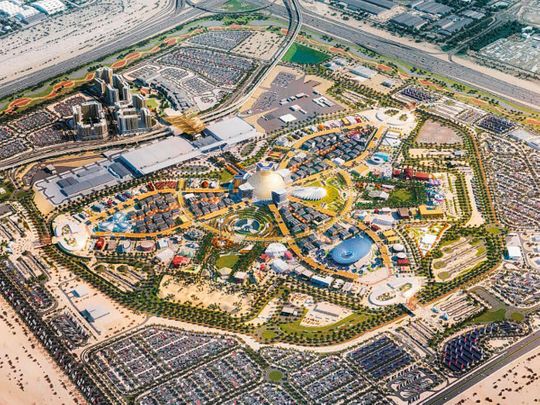
Expo 2020: Ambitious Plan
EXPO 2020 also has an “ambitious” volunteer program, which aims to include more than 30,000 volunteers from a wide range of ages, nationalities, cultures and backgrounds. The Expo site covers a total of 4.38 sqkm, including a 2 sqkm gated area. It is located adjacent to Al Maktoum International Airport in Dubai South. The six-month event is a long-term investment for the UAE, and is expected to significantly impact the country’s economy.
Expo 2020: Main Sub-Themes
There are three main sub-themes to the event: “Opportunity, Mobility and Sustainability”. These will take pride of place within three stunning UAE pavilions, but will also be found in other nations’ pavilions.
Expo 2020: Innovative Concepts of Regional Connectivity
It has introduced new “concepts of regional connectivity” and of course “international engagement”. It has showcased new methods of “cultural diplomacy” and “soft image” projection. Last but not least, it has institutionalized new ways and means of diversification of economy and of course UAE is the icon of economic diversification and de-carbonization in the GCC and MENA.
UAE: Hottest Destination of Global Tourism
From ancient times to modern market places, human interaction always generates an economic activity. From coin to bit-coin and from trade of slavery to start-up chains/ services and last but not the least, from caravans of silk route to modern virtual super expressways, fairs, exhibitions and expos always stimulate trade, travel and tourism around the globe and the UAE has now become one the “hottest destinations” of regional as well as international tourists. It encourages regional as well as international peace, stability and harmony through greater regional socio-economic integration, investments and business activities.
Expo 2020: Icon of Multiculturalism & Globalization 3
It protects “multiculturalism” which is the essence of globalization 3 and of course the UAE has become one of the ideal countries of tolerance, multiculturalism, cultural diversity because more than 150 different nationalities live peacefully since its inception. It gears associated sectors of national economy in the country. So, EXPO 2020 would be a “game changer” in the UAE and especially for Dubai which has been successfully transformed into hub of “financial cooperation”, international seminars, conferences and fairs.
Expo 2020: Multiplier Effects to Macro-Economy
Being prominent regional expert on the UAE/GCC, I hope that Expo 2020 Dubai will definitely support its macro-economy and further strengthen its drive of “economic diversification”. It is hoped that Dubai will be benefitted from its dividends even after the Expo, leaving a “sustainable economic legacy” that will help ensure the UAE remains a leading destination for business, leisure, hospitality, human comfort, foreign direct investments, re-export center and one of the ideal destinations of multiculturalism in the region as well as in the world.
Historical Perspectives
The World EXPO’s idea dates back to the Great Exhibition in London almost 168 years ago, when the UK wanted to boast of its cultural and industrial prowess, alongside 44 other countries. These days the events are held on a grander scale, but the underlying narrative is not so different. Next year it will be Dubai’s turn to host the event, the first time it has been held in the Middle East and marking a break from the usual run of European, North American and Asian hosts.
Expo 2020: Connecting Minds, Creating the Future
The Emirates Dubai has “big ambitions” for the event, which it is holding under the theme of “connecting minds, creating the future”. It is expected to attract more than 25 million visits to the Expo over the six months it’s on, from October 2020 to April 2021. That’s around 145,000 visits for every one of the 173 days the site is open. The organisers say most visits will be by people living outside the country, they are expecting 11 million visits by people living in the UAE and 14 million from overseas visitors.
Vast Global Participation
192 national pavilions for countries from Algeria to Yemen are designed by star architects such as Foster + Partners, Grimshaw Architects and Santiago Calatrava. There will also be a program of live events every day and 200+ food outlets.
Expo 2020: Huge Financial Opportunities
EXPO 2020 provides large financial opportunities to Dubai and the UAE alike. According to UAE’s official figures EXPO 2020 will provide an AED122.6bn ($33.4bn) boost to the local economy and support the equivalent of 49700 full-time jobs a year. The pre-Expo period is expected to deliver some AED37.7bn of gross value add (GVA) to the UAE economy, mostly from construction activity. While the Expo is being held, a further AED22.7bn in GVA is predicted, coming predominantly from spending on hotels and hospitality and business services. Finally, as much as AED62.2bn in GVA is anticipated in the decade after the Expo ends, as the legacy infrastructure starts to pay its way.
Direct Benefits
Of the overall AED122.6bn figure, some AED53.5bn is expected to come directly as a result of spending on the event and the legacy infrastructure. The rest will come indirectly, as a result of more distant economic activity further up the supply chain and in the wider economy. Moreover, London-based Capital Economics (2019) has predicted that economic growth in Dubai should range between 3.8 percent and 4.5 percent over the next few years, helped by a boost from the Expo. The organisers say that 80 percent of the Expo’s buildings and structures will be incorporated into a new business zone called District 2020, with the likes of Accenture and Siemens.
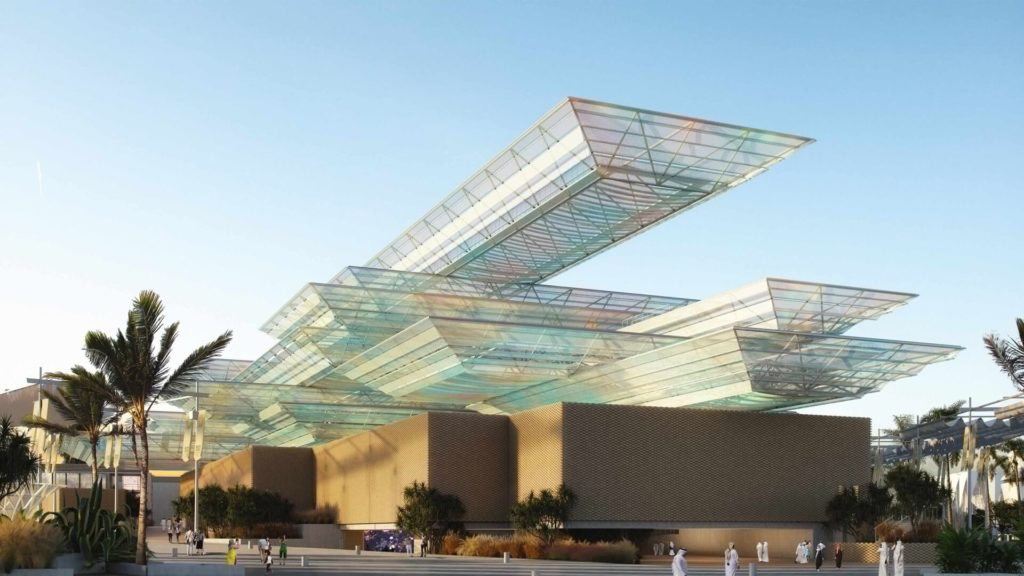
UAE’s Opportunity Pavilion
The “UAE Opportunity Pavilion” explores its ability to shape the future. It is made from organic materials such as timber, stone and woven rope, and has been designed to inspire empathy, encouraging a desire to better the world through interactive elements that are incorporated throughout. Moreover, visitors will be challenged to think about issues based on mankind’s most basic needs: water, food and energy, for example.
UAE’s Mobility Pavilion
“UAE Mobility Pavilion” will interact how people, goods, ideas and data move and what all that means. It has been designed by architects Foster + Partners, and takes visitors on a journey through time, from the House of Wisdom in ninth-century Iraq, to a futuristic world of artificial intelligence and virtual reality. Finally, there’s the Terra Sustainability Pavilion. The eye-opening experience takes you through forests, oceans and Earth’s corrupted wonders in a series of interactive exhibitions and elements.
Every participating nation will have a pavilion, each with its own agenda. For instance, New Zealand’s will be based in the “Sustainability District”, and will focus on the theme of “Care for People and Place”. It reflects the Maori value of “kaitiakitanga”, which emphasises the connection between humans and their environment. Its architecture illustrates “waka taonga”, the Maori tradition of using handcrafted containers to keep valuable items safe. Overall, visitors will experience an introduction to the nation’s culture, values, cuisine and design, and will also be able to check out a dedicated restaurant and store.
Saudi Arabian Pavilion
Over in the Opportunity District, the 13,000 square metre Saudi Arabian pavilion stands as the second largest in the entire expo after the UAE’s. Its theme is “the sky is the limit”, and the architecture resembles a large window that shoots up from the ground and soars into the sky. This is intended to symbolise the nation’s welcoming character. Visitors are shown the country’s transformation and how it has balanced its heritage with natural wonders, and will showcase the creativity of its population.
France Pavilion
The France Pavilion will be based in the Mobility District. The theme is “Lights”, Lights and the structure will feature a layer of colourful solar panels inspired by Claude Monet’s Water Lilies oil paintings. It has been built to showcase France’s rich culture and the nation’s move towards sustainability, exploring light as an enabler of progress, as well as a source for heat and creativity, all in connection with the Age of Enlightenment. There will also be a store and bistro, with a French-style terrace, and four gardens containing plant species that can be found in France, such as olive trees, yuccas and oleanders.
Expo 2020 – Clusters of Wonder Lands
Outside of the pavilions, there will be plenty of other experiences for visitors to explore. The world’s biggest 360-degree projection surface will be found on Al Wasl Plaza’s steel dome, while more than 200 food and beverage outlets will be offering everything from street food to haute cuisine and sustainable dining options. A rotating observation tower will allow guests a bird’s-eye view of the expo, while an abundance of Ghaf trees will provide shade across the site, alongside art installations by local and international artists.
There will always be something going on, as a jam-packed program has been drawn up. It includes live performances by comedians, dancers, acrobats, poets and roaming entertainers, as well as fashion shows, educational workshops and plenty of panel discussions and talks. Wellness and fitness activities include everything from mindfulness sessions to extreme sports and virtual reality experiences.
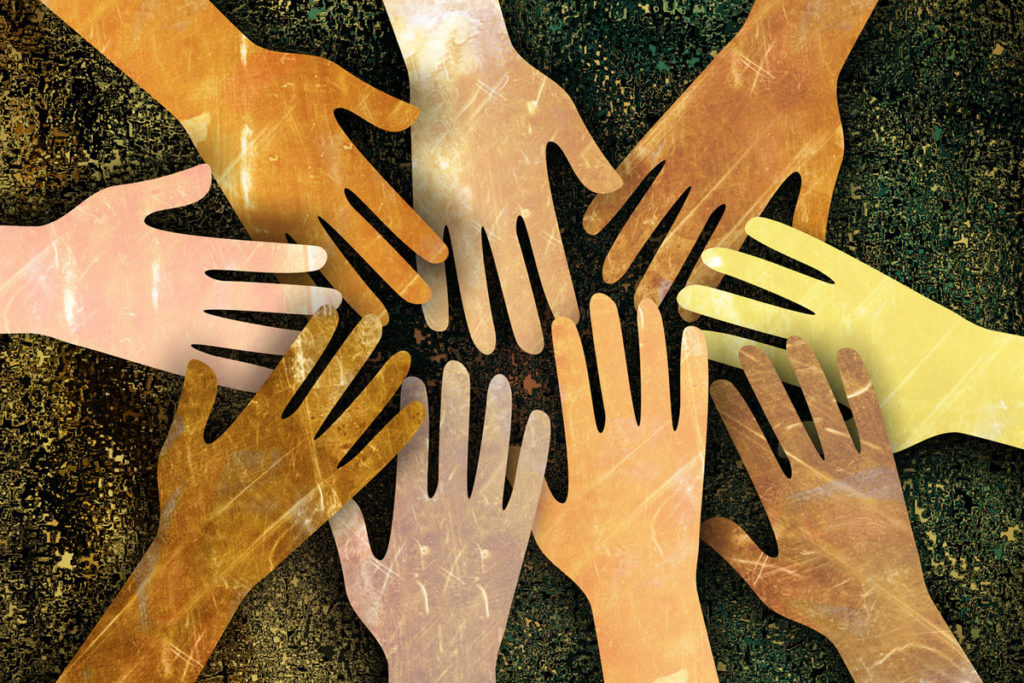
Expo 2020 – Culture Diversity at its best
There will be a whole schedule of cultural activities, too, as every day the spotlight turns to one of the 192 participating nations, allowing each country to showcase their own quirks; one day visitors might sample a Finnish feast, while the next could see them experiencing traditional dances from Africa. In the evenings, fireworks and concerts have been scheduled to keep people busy until the early hours. Celebratory occasions that take place during Expo 2020, such as Christmas and Diwali, will also be marked with special events.
Expo 2020 – Mother of Event Management
Being prominent regional expert of UAE/ GCC I expect that there will be huge impact on its event management, services, construction, transport, storage, communication and retail sector from the EXPO 2020 because it is a long term investment in the future of the UAE. It is expected to contribute AED 122.6 billion to the national economy, as well as supporting small businesses, boosting the job market and fostering innovation for years to come. It is also a catalyst for economic, cultural and social transformation and generates important legacies for the host city and nation. Dubai and the UAE became a candidate city of the bid process to host World Expo 2020 in November 2011.
Expo 2020 – Job Generation Machine
Moreover, the EXPO 2020 is also expected to generate as many as 905200 full-time equivalent (FTE) job-years in the UAE between 2013 and 2031, approximately the equivalent of 49,700 FTE jobs each year in the same period. The figure does not include the estimated 30,000 volunteers.
Different Stages of Economic Dividends of Expo 2020
The economic benefits to Dubai from Expo will come in several phases: pre-Expo, during-Expo, and the legacy phase, each of which will generate jobs and economic activities of various kinds.
In the pre-Expo phase which spans from 2013 until the beginning of the event begins in October 2020 the key economic impact has come from the employment generated by on-site construction and associated jobs and spending. Of the period’s total gross-value added (GVA) to GDP of $10.3bn, 68 percent is expected to be felt in the construction sector, with another 20 of spending, roughly equal to $1.28bn, directed towards Dubai’s SME sector.
During the six months of the event between October 2020 and April 2021, an additional $6.2bn is expected to be added to GDP, primarily stemming from the visitor expenditure On-site visitor spending includes items such as entry tickets, as well as purchases of food and beverages, while off-site spending items includes flights to and from Dubai, hotel stays, retail and local transportation.
It is predicted that its economic dividends will be felt in the decade after the event itself. During this period which will run from May 2021 to December 2031 the Expo site will be reborn as District 2020, which will include a variety of tenant companies and an expanded Dubai Exhibition Centre.
The coming event is like a catalyst for real estate development activity in the Dubai and the whole UAE. It is a festival of human ingenuity. Expo is a global destination for millions of people who would like to have an eye on the development of human creativity over the years.
Expo 2020 – New Stage of Development of International Relations
EXPO 2020 Dubai will become a new stage in the development of international relations. New doors to the markets of many countries will open. First of all, effective trading channels to the markets of Asia and Africa will be established, which will enable to increase volume of re-export and export.
The United Arab Emirates have always been supporters of peace and stability in the Middle East region. State policy is aimed at maintaining tolerance and human rights protection. The world Exhibition will be a perfect ground to continue to promote mutual understanding between nations and strengthen peaceful relations. Holding the international exhibition will be a real possibility for the world to achieve common progress and strengthen global economy.
Dubai is synonymous for superior tourism, exceptional hospitality, and retail offerings. Expo 2020 Dubai will help the world see how much more we have to offer. The Expo 2020 journey became official on 27th November 2013, when Dubai won the rights to host amidst cheers, jubilations and fireworks. A National Holiday was declared for all educational institutions across the country the following day. It aims at leaving a meaningful and lasting legacy that would last for generations by the time the Expo is officially over.
Concluding Remarks
The United Arab Emirates is an innovated country and pioneer of regional innovation. It has initiated various policies to institutionalize policies and programs of innovation. It has become first country to establish “Artificial Intelligence Ministry” in the region as well as in the world. It has first country to form an AI University. It has successfully out-broke outer space. It is first in its rigorous persuasions of renewable energies in the region. Masdar has become top learning center of innovations and technologies.
UAE has now shifted its focus on rapid growth of “start-up” sector. It has already introduced diversified but integrated policies and programs for its growth. Rapid growth of SMEs, tourism, service, banking and financial markets has transformed its future outlook. Moreover, Expo 2020 has revolutionized the concept of regional connectivity and global accessibility. Expo 2020 is the giant step towards further diversification of economy, service, tourism and above all soft image projection of the country.


